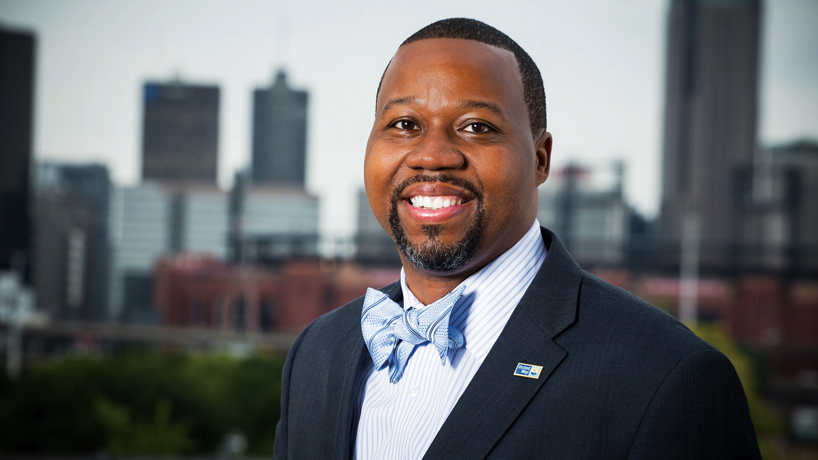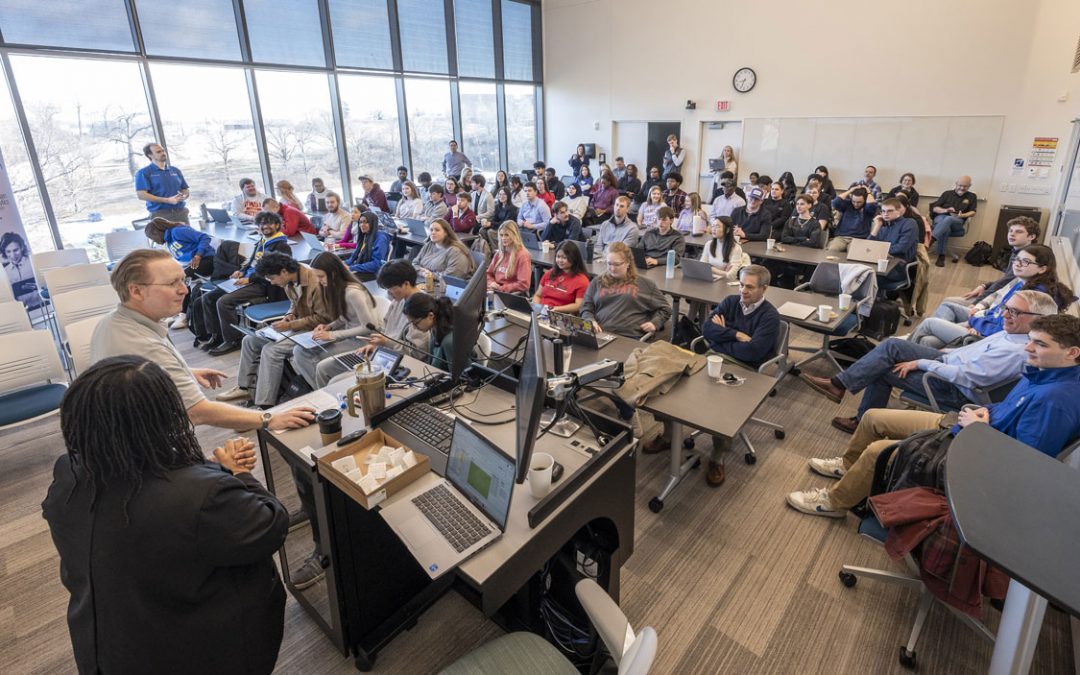
Orvin Kimbrough (MBA 2002) has served as the president and CEO of United Way of Greater St. Louis since 2013. UMSL is currently participating in United Way and Community Health Partners campaigns during its Month of Community Giving.
Orvin Kimbrough’s first involvement with United Way was as a kid in the foster care system growing up in north St. Louis.
He’d see the logo when United Way volunteers would come to do their site visits, and though he didn’t fully grasp the organization’s work or its reach, he understood it offered help and hope as he overcame a difficult upbringing.
“I entered the system when I was 8, and I aged out at 21, and it was almost like this invisible hand,” Kimbrough said. “My earliest memories of United Way are as a kid who needed a hand up.”
Kimbrough, more than most people, can testify to the impact United Way can have on a person’s life. It was instrumental in him making it to college, and he went on to earn bachelor’s and master’s degrees in social work from the University of Missouri–Columbia, an MBA from the University of Missouri–St. Louis and a master’s degree in theology from Aquinas Institute of Theology.
He began working for United Way of Greater St. Louis as vice president of major gifts in 2007 and climbed the ranks to become the organization’s president and CEO, a job he’s held since 2013.
Kimbrough is set to leave his post in February when he officially takes over as the next CEO of Midwest BankCentre.
UMSL is currently working to raise funds in that support United Way, as well as Community Health Charities, during its Month of Community Giving. With that in full swing, UMSL Daily caught up with Kimbrough to discuss the current campaign; the work of United Way more generally, specifically in north St. Louis County; and ways he and the organization partner with UMSL.
How will this campaign affect the St. Louis community?
Through the campaign United Way raises dollars to help people in this community live their best possible lives. It’s important because every life is a little different, so we want to help people optimize their life chances. Through the community campaign, we support more than 160 local organizations that serve people all throughout our 16-county region on the Missouri and Illinois side.
In addition to supporting member agencies, the dollars raised through the campaign support programs and services like the 2-1-1 help line and the region’s volunteer center. These are great assets for the region. If you need help, you can call 2-1-1, and we can connect you to services. If you’re looking to get involved in civic activities, we can connect you through our volunteer center. The campaign helps with all that.
People might be making charitable donations to a lot of different places, so what do you tell them about why they should contribute to this kind of campaign?
As a kid who had a really tough upbringing, I saw a lot, and my memories run deep. And rare is it one organization that helps to change a life. It’s almost always a number of organizations that are weaved together that change a life. So when I think about what it takes for us as a community to really care for people in community, it takes a number of organizations, and United Way’s in that business of pulling together great organizations to help transform lives.
How do the 160 agencies get connected to United Way?
We are all a part of the same ecosystem. Our agencies cover all issues, from senior services to families who are working with kids with disabilities to people who need food or who need shelter, who need clothing. We all kind of work to create this system of support for people in the region, so we work in partnership, so all of these agencies are independently operated, but we sign a covenant to be there for one another. Our job in this equation is to help raise money, to help convene these organizations, to help organize the organizations in a way that makes sense for service delivery in the region.
Are there specific United Way initiatives that are geared or targeted toward north St. Louis County and areas around UMSL?
So in 2017, United Way and our member agencies supported about 15,000 people in the 63121 zip code and more than 70,000 in the surrounding areas. We partnered with Emerson to create a targeted individual development account program. The idea behind that is for people who are poor or working class, you don’t spend your way out of poverty. You save your way out of poverty. The program provides matched-savings accounts to low- to moderate-income working families residing in the north county area, to help them build wealth and home ownership and small business development and to go onto postsecondary education. So far in the area, 61 families have opened up individual development accounts through the program, saving nearly $70,000 with more than $70,000 in grants distributed to families in the area. It is really just an incredible program. If I told you for every dollar you save, I’ll put a dollar in a savings account for you, that’s a good thing.
Are there ways that United Way helps college students specifically?
One one of our impact areas is fostering learning, which is really designed to help all children and young people reach their full potential. From youth workforce development, United Way and several of our partner agencies provide students and young people with the skills, support and environment they need to succeed in school and life. United Way also provides many, many opportunities for college students and young people to get engaged with the community and gain skills and experience that would benefit their career.
We have something called Student United Way, which is a grant program to allow college students to find ways to give back to their community. Through this program, we award one-time grants to student-led community service projects or initiatives. We’ve awarded more than $40,000 to student-led initiatives in the last several years.
Through our volunteer center, United Way also provides UMSL and many other local institutions of higher learning customized technology solutions that allow students to track their volunteer time and to match their skills and passion to their interest. So UMSL is actually on our platform and a partner in that.
We also have a GenNext program. GenNext is really a way for college students to get involved in the community. It is also a community for students and young professionals to find meaningful volunteer opportunities in the region while networking and making new friends.
How do you feel like your relationship to UMSL and people here has impacted you? How did that contribute to the career path you’ve taken and getting into United Way?
I studied business at UMSL, but even before that, in 1994, when I came out of high school, I needed remediation. I spent that summer on UMSL’s campus, and it was inspiring. I was first-generation and never expected to go to college. I struggled academically, struggled on standardized tests, and UMSL was my bridge. It was my gateway to get me to the point that I am now. When I look back on my life, that was an incredibly pivotal point for me. I took English, and I took math, but more than that, I was beginning to become socialized in, “Here is what it takes to achieve on a university campus.” You build relationships with students and with the faculty.
I’ll never forget a faculty experience that I had. I always struggled mightily at math, but I did fairly well with English, and my English professor on UMSL’s campus essentially said, “You’re pretty good. You ought to consider writing and just being more disciplined around this because you have a gift. You have a talent.” That encouraged me. I think that when you never expect to go to college, and you still don’t have the confidence to be in college, to have people to speak into your life the way many of the folks at UMSL did early on, it serves to create that platform to catapult you.
I’m where I am, in part, because of the folks who took an interest during my early college experience. Then I went off to Mizzou, and then I came back and got an MBA at UMSL. It was challenging, and it was stimulating. I’ll never forget the group learning sessions. How do you operate effectively in team settings? I’m now designing a course on teams and leadership for Washington University, but my first team experience in a quasi-professional environment was UMSL. I’ll never forget it.
What’s it like to get to do work with your alma mater now?
On the occasions where I’m able to connect with UMSL, it feels great. Mostly, what happens with me now is I end up coaching students who are somehow affiliated with UMSL. It’s great because we all have sort of our own unique story, and UMSL, while rigorous, fights to give shots to people who would not otherwise have shots. It’s a public institution. It’s here for all of us, and you’re going to get a quality, reasonably priced education. When I get a chance to spend time with the students of UMSL, I certainly appreciate it.
Beyond these campaigns, what are some other ways that the university and United Way work in partnership?
We’ve had some joint research efforts, and the university has been really instrumental. We’re doing comprehensive community needs assessments now, and we leverage the university’s tremendous assets on the research side – both qualitative and quantitative – to help us give a perspective about the region. It’s a tremendous asset here. Our partnership with UMSL helps us be better as a helping business, a helping organization.
Given your earliest experiences with United Way, what was it like to ascend to your current position and get to have that kind of impact?
I think it’s surreal. It still is right now. I grew up in the gutter, in the sewers – and I say sewers because oftentimes we look at our most challenged neighborhoods as just that. We sometimes relegate them to second class. For me to have ascended to this role at United Way, I felt like there was a hand on my shoulder, guiding me because, otherwise, I don’t think I could have with my own strength ascended to that level and then been successful. Last year, we were the most successful United Way, from a revenue standpoint and an impact standpoint, in all of North America. In addition to that invisible hand on my shoulder, there have been physical hands on my shoulder, and these are the people in community, in our corporate life and in our community life, who you are doing life with, who want to see you successful, and they want to see the organization successful. They stretch with you, and they have vision with you. That’s a powerful thing.
What have been the most memorable parts from your tenure at United Way?
I’m at this bittersweet moment. I think the most memorable part is the relationships are broad. There is absolutely nothing like it in terms of a platform. I know people in every business. I know people in every community organization. I know people in north city, in rural Illinois. That’s the most extraordinary piece to United Way that most people don’t get. You get this glimpse of the region in a way that most people just don’t get, and you get that because of what United Way is. We exist to create conditions to help all people live better lives. There’s something that accrues back to you spiritually when you help somebody else who’s in a tough spot. I think I will miss the incredible reach of those relationships.














